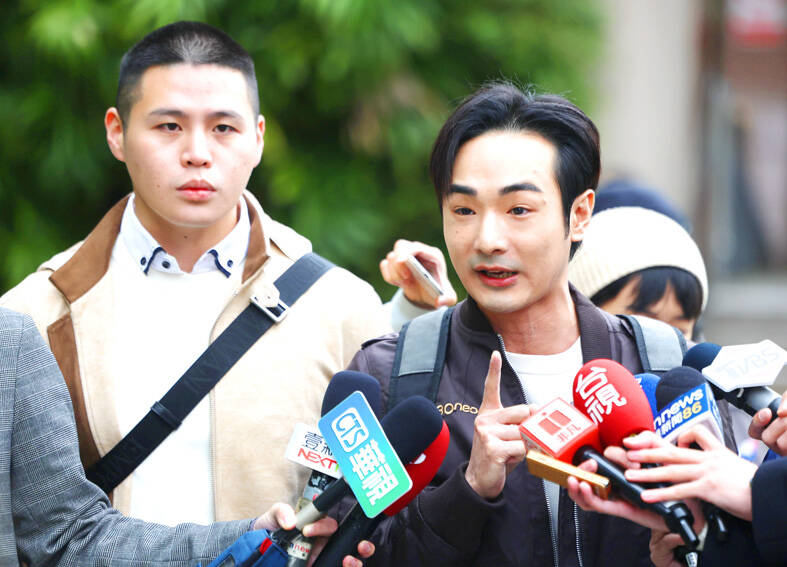The primary goal of responding to China’s “united front” propaganda on social media should be to expose intermediaries so they face public scrutiny, Democratic Progressive Party Legislator Puma Shen (沈伯洋) said.
The statement came in response to Taiwanese rapper Chen Po-yuan (陳柏源) exposing methods the Chinese Communist Party (CCP) uses to bribe Taiwanese influencers to promote its propaganda in a video produced by YouTuber “Pa Chiung (八炯)” that was published online on Friday.
Commenting on the matter, Shen on Saturday said the government should establish mechanisms to respond to online propaganda, so the public can report influencers’ “united front” activities.

Photo: CNA
This would increase public awareness and reduce the harm caused by influencers’ propaganda, he said.
Regulations imposed by tracking cash flow to influencers could be quickly circumvented, Shen said.
China could instead use virtual currencies or underground exchanges between Chinese and international platforms to avoid detection, he said.
For example, influencers could create pro-China videos on YouTube while “selling products” on Douyin, he said. While the cash flow should be investigated, the primary goal should be to identify “united front” intermediaries, including travel agencies, gangsters, academics, businesspeople and even legislators and public servants, he said.
Without these intermediaries, it would be much harder for China to engage with Taiwan’s public, he added.
China’s primary method of recruiting Taiwanese influencers is by attracting pro-China supporters to specific content and using Alipay or WeChat for donations, Kuma Academy chief executive officer and Taiwan National Security Institute deputy secretary-general Ho Cheng-hui (何澄輝) said.
Influencers need not visit China, but can post videos with donation QR codes on social media platforms and circulate them through closed communities like Line groups, Ho said.
It is very difficult to track online cash flows, he added.
However, if platforms take responsibility for revealing “united front” propaganda that is disguised as neutral and objective content, the public can develop the ability to recognize it, weakening its influence, he added.
In recent years, China’s “united front” efforts have had two main aspects, Taiwan Thinktank China Research Center director Wu Se-chih (吳瑟致) said.
The first is expanding China-friendly forces in Taiwan, such as the group of Chinese students associated with the CCP invited to Taiwan for a visit by the Ma Ying-jeou Foundation, Wu said.
The second is using influencers, as they can reach a wide audience and online freedom of speech shields them from legal issues, as long as there are no personal attacks, he said.

Beijing could eventually see a full amphibious invasion of Taiwan as the only "prudent" way to bring about unification, the US Department of Defense said in a newly released annual report to Congress. The Pentagon's "Annual Report to Congress: Military and Security Developments Involving the People's Republic of China 2025," was in many ways similar to last year’s report but reorganized the analysis of the options China has to take over Taiwan. Generally, according to the report, Chinese leaders view the People's Liberation Army's (PLA) capabilities for a Taiwan campaign as improving, but they remain uncertain about its readiness to successfully seize

Taiwan is getting a day off on Christmas for the first time in 25 years. The change comes after opposition parties passed a law earlier this year to add or restore five public holidays, including Constitution Day, which falls on today, Dec. 25. The day marks the 1947 adoption of the constitution of the Republic of China, as the government in Taipei is formally known. Back then the Chinese Nationalist Party (KMT) governed China from Nanjing. When the KMT, now an opposition party in Taiwan, passed the legislation on holidays, it said that they would help “commemorate the history of national development.” That

Trips for more than 100,000 international and domestic air travelers could be disrupted as China launches a military exercise around Taiwan today, Taiwan’s Civil Aviation Administration (CAA) said yesterday. The exercise could affect nearly 900 flights scheduled to enter the Taipei Flight Information Region (FIR) during the exercise window, it added. A notice issued by the Chinese Civil Aviation Administration showed there would be seven temporary zones around the Taiwan Strait which would be used for live-fire exercises, lasting from 8am to 6pm today. All aircraft are prohibited from entering during exercise, it says. Taipei FIR has 14 international air routes and

Snow fell on Yushan (Jade Mountain, 玉山) yesterday morning as a continental cold air mass sent temperatures below freezing on Taiwan’s tallest peak, the Central Weather Administration (CWA) said. Snowflakes were seen on Yushan’s north peak from 6:28am to 6:38am, but they did not fully cover the ground and no accumulation was recorded, the CWA said. As of 7:42am, the lowest temperature recorded across Taiwan was minus-5.5°C at Yushan’s Fengkou observatory and minus-4.7°C at the Yushan observatory, CWA data showed. On Hehuanshan (合歡山) in Nantou County, a low of 1.3°C was recorded at 6:39pm, when ice pellets fell at Songsyue Lodge (松雪樓), a